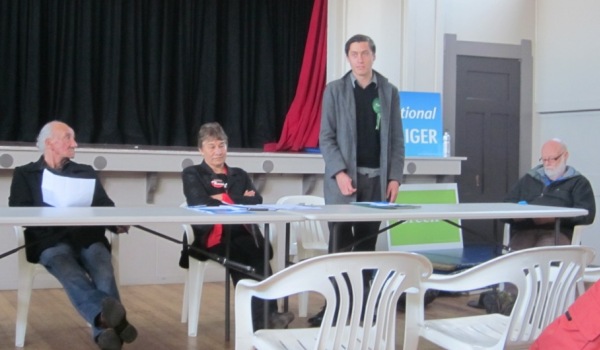About 24 people attended the ‘Meet the candidates’ held in the frigid Raglan Town Hall on Saturday 23rd. The meeting was organised by the Raglan Residents & Ratepayers and Whaingaroa Environmental Defence groups. It was chaired by Malibu Hamilton with Bob MacLeod keeping the time. Representatives from the National Party, Labour Party, Democrats for Social Credit, Internet MANA and Green Party each spoke for five minutes outlining their parties policies. The meeting was then opened up to questions from the floor.
The first question on what their party would do about incompetent local government that puts sewage in the harbour, was poorly answered by the candidates who mainly gave suggestions on what residents could do it about it.
A question on euthanasia was answered by most with a comment along the lines of, ‘their party policy was that there needs to be a national conversation about this’. Angeline Greensill for Internet MANA said that the party did not have a view on this and that euthanasia did not fit with Maori culture. Others also gave their personal position.
A question on poverty for working families gave the candidates a chance to expand on the polices of their parties in this area. Barbara Kuriger (National) said they were already doing a lot. This statement didn’t go down well with the audience. Penny Gaylor (Labour) was able to say she had real experience of this having been a single parent and outlined Labour’s. Both Angeline Greensill (Internet MANA) and Robert (Green Party) outlined their strong policies on reducing poverty.
One area of difference for the parties was their policy on taxes. Barbara Kuriger (National) said no changes, Penny Gaylor (Labour) said an increase in the top marginal tax rate, Caroline McKenzie (Democrats) said a 0.1% financial transaction tax, Angleline Greensill (Internet MANA) said no GST but instead a 1% transaction tax. Robert Moore (Green Party) covered a policy of increasing the top tax rate to 40%, reducing tax on the lower areas of income. The Green Party also supports a financial transaction tax.
Other questions related to the cost of getting to hospital, subsidies for dental services, immigration and small towns dying.

I agree there were no answers to incompetent local government, but we can see the danger of government interfering with local democracy in the continuing suspension of Environment Canterbury. I think it’d be improved by having political parties contesting council elections. That way we could see what policies they proposed and how they compared with alternatives. If a party were as incompetent as our current council we would have clear alternatives to vote for. There’d also be more publicity as each party tried to promote its policies and successes and the others tried to highlight their shortcomings.Some of us in the Greens are having some success in persuading the Greens to contest local elections. Maybe members of other parties can work towards that too?
One of the problems with answers at events such as these is that candidates often can’t recall all their policy. For example, the Green Party policy (https://home.greens.org.nz/policy/local-government-policy) has a couple of statements which would go a long way to solving the problems we have – “Decisions should be taken at the level closest to the citizens, town, city or region and only those tasks that the local level cannot effectively carry out alone should be referred to higher levels.” and “Review the status of community/local boards with a view to enhancing their role and use by local authorities.” Our council rejected the devolution of powers to Community Boards, but if they were given more power, they could be effective checks.